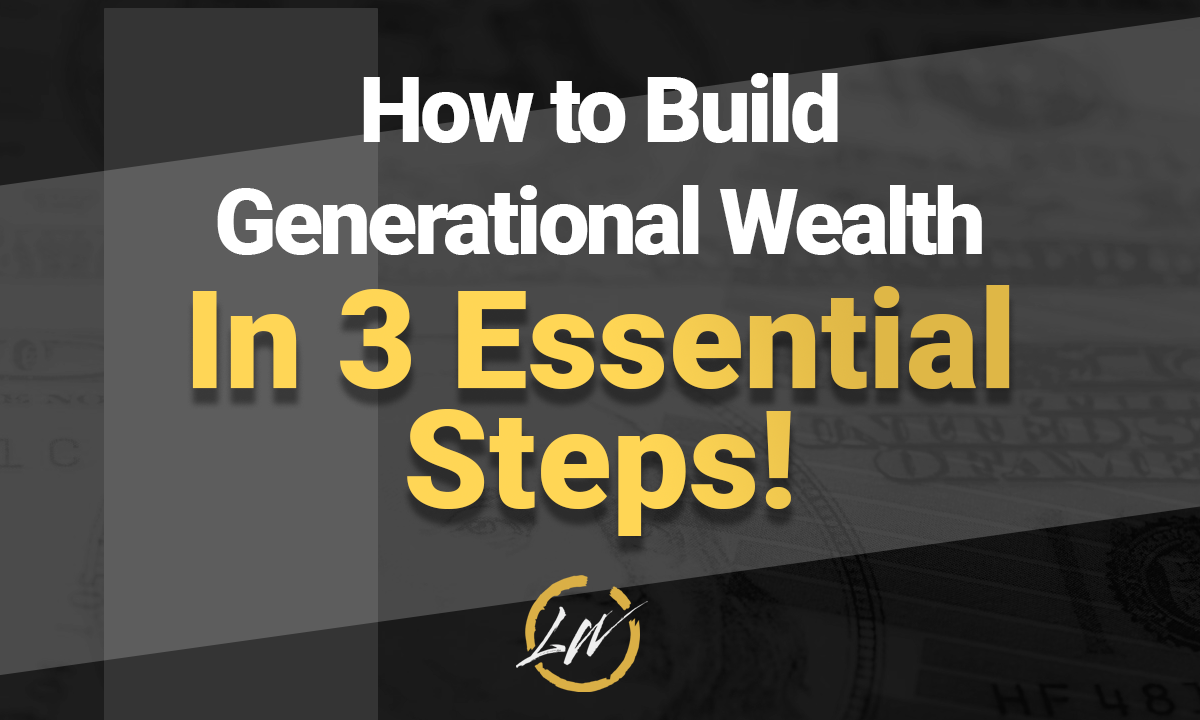Do you want to secure your family’s financial future for generations to come? Today, we’re going over the three essential steps to learn how to build generational wealth.
With rising costs of living, fluctuating markets, and changing tax laws, it’s more important than ever to have a solid strategy in place to preserve and grow your wealth over time.
In this blog post, we’ll delve into the key principles and strategies you need to know to build generational wealth.
From shifting your mindset to understanding the power of evergreen assets, trusts, and life insurance, we’ll cover it all. So buckle up and get ready to dive into financial freedom and legacy-building like never before.
The Foundational Mindset Shift
The first thing you need if you want to build generational wealth is a mindset shift. I‘m a big believer in the biblical proverb that says, “As a man thinketh in his heart, so is he.” It all starts with how we think about wealth and our financial goals.
Now, I’m not here to give you a motivational speech or anything, so if you’re constantly thinking about retirement as the end goal, and you genuinely want that, that’s completely fine. Continue working at your 9 to 5 and at 65 you can enjoy your retirement. That’s totally fine for some people.
But what we’re talking about is leaving a legacy that lasts for generations. In order to do that, you need to build what we essentially call a life you won’t want to retire from, a life where your wealth continues to grow and benefit future generations long after you’re gone. That’s the kind of mindset shift we’re talking about here – the empire over retire mindset.
So, the first thing you need to do is decide what your goal is, and which approach calls to you more? Do you want to hustle until you’re 65 and then make do with the little retirement money you have left, or would you prefer to build wealth that continues to grow and benefit future generations long after you’re gone?
Building generational wealth isn’t easy, but if you’re willing to put in the work, it’s where the magic happens.
Building Generational Wealth with Evergreen Assets
Alright, let’s talk about how you can actually build generational wealth. The short answer is evergreen assets. These are the foundation of a lasting legacy, and understanding them is key to your financial success.
What Evergreen Assets Are and Why They Matter
So, what exactly are evergreen assets? They’re investments that have the potential to grow and generate income over the long term. Unlike traditional investments that may have ups and downs, evergreen assets are designed to stand the test of time.
But why do they matter? Well, think about it like this – if you want to build generational wealth, you need assets that will continue to provide value for years to come. Evergreen assets are like the gift that keeps on giving – they generate income, appreciate in value, and can be passed down to future generations. In other words, they’re the building blocks of a lasting legacy.
Evergreen Assets: Farmland, Real Estate, Businesses
Now that you know what evergreen assets are, let’s look at some examples. Farmland, real estate, and businesses are all classic examples of evergreen assets. Why? Because they have intrinsic value that tends to appreciate over time, and they can generate income through rent, lease agreements, or profits from operations.
Take farmland, for example. It’s not making any flashy headlines, but it’s a tried-and-true investment that has stood the test of time. As the population grows and demand for food increases, the value of farmland tends to rise. Plus, you can lease it out to farmers and collect passive income year after year.
Real estate is another evergreen asset that’s been used to build wealth for centuries. Whether it’s residential properties, commercial buildings, or vacant land, real estate has a unique ability to appreciate in value over time. And with rental properties, you can enjoy a steady stream of income while your investment grows in value. So, we definitely recommend investing in real estate.
Finally, businesses are perhaps the ultimate evergreen financial asset to create wealth. When you own a successful business, you’re not just investing in a product or service – you’re investing in a legacy. Businesses can generate income for generations to come, and if managed properly, they can become a cornerstone of your family’s wealth for years to come.
The Role of Income-Producing Assets in Generational Wealth
Income-producing assets, like the ones we’ve discussed, are essential for building a lasting legacy. They provide a steady stream of income that can be reinvested to fuel further growth, and they act as a hedge against inflation and market volatility.
But perhaps most importantly, income-producing assets provide financial security for future generations. By investing in evergreen assets that generate passive income, you’re setting your family up for success long after you’re gone. It’s like planting a tree – the sooner you start, the sooner you’ll reap the rewards.
So, if you’re serious about building generational wealth, start thinking about evergreen assets. Whether it’s farmland, real estate, or businesses, these investments have the potential to create a lasting legacy that will benefit your family for generations to come.
Trusts and Estate Planning: Preserving Wealth Across Generations
Alright, buckle up because we’re diving deep into the world of trusts and estate planning. If you want to build generational wealth that stands the test of time, this is where the rubber meets the road.
Set the Stage for Success with Estate Planning
Of course, building generational wealth isn’t just about acquiring assets – it’s also about preserving them. That’s where estate planning comes in. By setting up trusts, you can ensure that your assets are protected and distributed according to your wishes long after you’re gone.
Without proper estate planning, your hard-earned wealth could be tied up in probate court for years, subject to hefty estate taxes, or end up in the wrong hands. By taking the time to create a comprehensive estate plan, you can protect your assets and provide for your loved ones for years to come.
Trusts as Vehicles for Wealth Preservation
Trusts are legal entities that hold assets on behalf of beneficiaries, allowing you to control how your assets are distributed long after you’re gone. They come in all shapes and sizes, from revocable living trusts to irrevocable trusts, each with its own set of benefits and drawbacks.
But why are trusts so important for preserving wealth? Because they provide a level of control and protection that traditional asset distribution methods simply can’t match. With a trust, you can specify exactly how and when your assets are distributed, ensuring your beneficiaries are taken care of according to your wishes.
Comparing Asset Distribution Model vs. Family Office Model
When it comes to estate planning, there are two main approaches – the asset distribution model and the family office model. Let’s break it down:
The asset distribution model is the default approach, where assets are distributed directly to heirs upon your death. It’s simple and straightforward, but it doesn’t provide the level of control and protection that trusts offer.
On the other hand, the family office model takes a more hands-on approach, treating your estate like a business that’s managed by a team of professionals. This model is more complex and requires ongoing management, but it can be incredibly effective at preserving wealth and fostering a culture of stewardship among your heirs.
Addressing Family Dynamics with Failsafe Mechanisms
Last but certainly not least, let’s talk about family dynamics. Estate planning isn’t just about numbers and legal documents – it’s about people. And when it comes to preserving generational wealth, communication is key.
By discussing your estate plan openly and honestly with your family members, you can avoid misunderstandings and prevent potential conflicts down the road. It’s also important to put failsafe mechanisms in place, such as prenuptial agreements, buy-sell agreements, and contingency plans, to ensure your wishes are carried out even in the face of unforeseen circumstances.
At the end of the day, estate planning is about more than just money – it’s about preserving your legacy and providing for your loved ones for generations to come. So take the time to create a comprehensive estate plan that reflects your values and priorities, and rest easy knowing that your financial legacy is in good hands.
Leveraging Life Insurance to Build Generational Wealth
One powerful tool for building generational wealth is life insurance. When used strategically, it can be a powerful tool for enhancing your generational wealth strategies. Let’s explore how:
The Role of Life Insurance in Estate Planning
Life insurance plays a crucial role in estate planning by providing liquidity to cover expenses and taxes upon your death. Instead of forcing your heirs to sell off assets to pay estate taxes, a life insurance policy can provide the necessary funds to cover these costs, ensuring your assets remain intact for future generations.
But life insurance isn’t just a one-size-fits-all solution, it’s important to carefully consider your options and choose the policy that best aligns with your estate planning goals.
Using Whole Life Policies for Liquidity and Growth
Unlike term life insurance, which only provides coverage for a specific period of time, whole life insurance offers lifelong protection and includes a cash value component that grows tax-deferred over time.
By leveraging whole life policies for liquidity and growth, you can create a sustainable source of funding for your estate plan while simultaneously building wealth for future generations. The cash value of your policy can be accessed through policy loans or withdrawals, providing you with the flexibility to cover expenses or invest in income-producing assets.
Incorporating Life Insurance in Trusts
One of the most powerful ways to incorporate life insurance into creating generational wealth is by placing policies inside of trusts.
Here’s how it works: When you pass away, the death benefit from your life insurance policy is paid out to the trust, providing liquidity to cover expenses and taxes. The trust then uses these funds to purchase new life insurance policies on the next generation, continuing the cycle of wealth preservation and growth.
By integrating life insurance into your trusts, you can ensure that your heirs have the resources they need to carry out your wishes and build upon the foundation you’ve laid. It’s a powerful strategy that can help you leave a lasting legacy for your loved ones.
So, there you have it – a blueprint for building generational wealth. It starts with shifting your mindset and embracing the idea of leaving a lasting legacy.
But remember, building generational wealth takes time and patience. It’s not something that happens overnight, but with dedication and perseverance, you can create a financial legacy that will benefit your family for generations to come.






